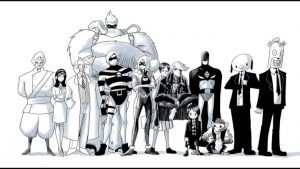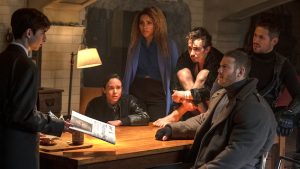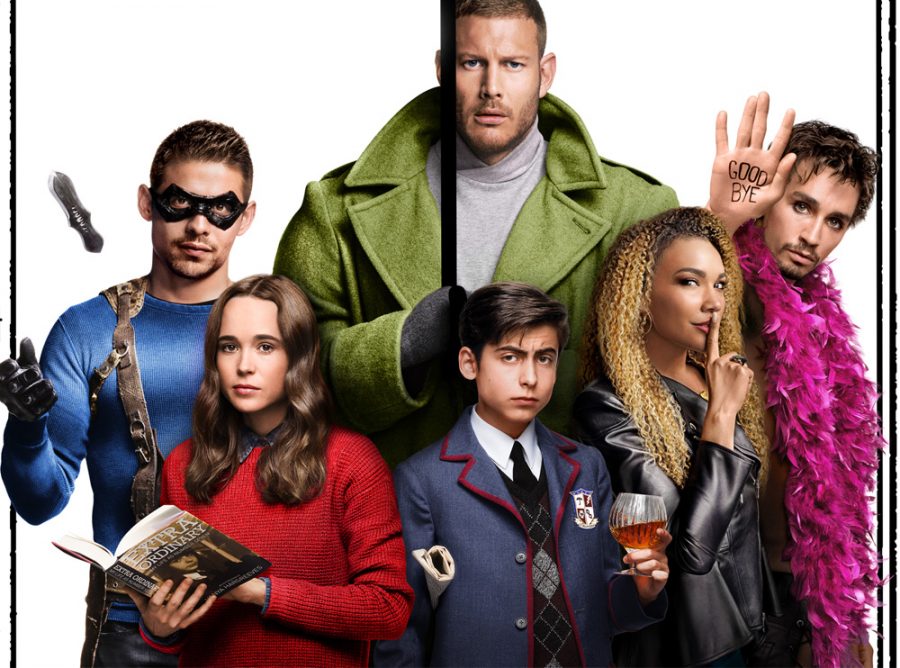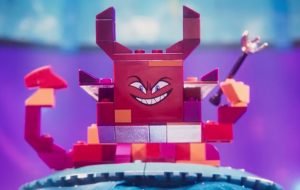Super-dysfunctional family proves super-functional on the small screen
The six Hargreeves siblings, raised to work together as a super-team, are far more “super” than “team.” Their adventures in saving the world are available on Netflix, in “The Umbrella Academy.”
February 24, 2019
The dad’s an emotionally distant billionaire. The mom’s an android. The butler’s a monkey. The superpowered children are broken and dysfunctional adults. Welcome to the Umbrella Academy, where family reunions literally are the end of the world.

“The Umbrella Academy” began as a comic book, written by Gerard Way and drawn by Gabriel Bá. The Netflix series loosely follows the plot of the comic’s first volume, “Apocalypse Suite.”
“The Umbrella Academy,” an all-new Netflix miniseries, debuted last Friday with its first ten-episode season. Based on the comic book series from Gerard Way and Gabriel Bá, this mature series was a riveting success, providing viewers with an intense, unpredictable, and superbly fun take on the superhero genre.
This season features a charismatic cast of engaging characters, a stylish and confident style, and fight scenes that fans of the Defenders franchises will drool over. No doubt, this is another must-watch series from the world’s largest streaming service.
When eccentric billionaire Reginald Hargreeves adopts seven super-powered children and heartlessly raises them to be the ultimate fighting force, the result is a dysfunctional family of emotionally stunted adults who want nothing to do with their cold, demanding adoptive father. Having grown up and gone their separate ways, the six surviving Hargreeves children reunite when Reginald dies, only to discover that the world needs saving from an impending apocalypse.
“The Umbrella Academy” is heartfelt, awesome, quirky, and engaging from start to finish. The cast’s acting talent is matched only by the talent of the directors, editors, and cinematographers involved.
The show stands apart from the heavily dramatic Marvel series on Netflix with its playful and stylish humor that blends seamlessly with the emotionally heavy themes of the characters, who single-handedly drive the show with their various powers and character flaws.
The season’s villains, a pair of time-traveling assassins dedicated to stopping the Academy from preventing the apocalypse, are comparable only to Count Olaf from “A Series of Unfortunate Events” for being undoubtedly evil and simultaneously instantly likable. Any complaint leveled against this series falls flat in the face of everything that went right.
The production value of “The Umbrella Academy” is extremely high, rising to meet the demands of a superhero-based series. Across the season, especially in the dynamic fight scenes, viewers will be dazzled by a wealth of incredible special effects. Pogo, the Hargreeves’ monkey butler, looks perfectly realistic, despite being an entirely CGI character. Scenes with teleportation, telepathy, and time travel aren’t forced to cut corners, but rather show perfectly-rendered CGI effects. The effects are honestly as good, if not better than many blockbusters you’ll find in theaters.
The special effects were complemented by mind-boggingly talented camera work and editing styles. Too often action scenes are hard to follow due to sloppy, choppy jump cuts, but in “The Umbrella Academy” each scene is handled expertly. Split screens, slow motion, and creative camera angles are all used to maintain the momentum of the action sequences throughout the season.
“The Umbrella Academy” stands out for its use of music. Although it’s not a constant feature like in “Baby Driver,” the soundtrack of the show is the best I’ve ever witnessed in a TV series. The music in “The Umbrella Academy” adds intensity in some places and emotional significance in others, but it’s primarily a source of ironic humor. Often, the show juxtaposes its brutal fight scenes with an upbeat song, like “Istanbul” or “Sunshine, Lollipops and Rainbows.” This provides the perfect touch of absurdity that creates a far more entertaining brawl.
The musical and visual components of the show are phenomenal, but these aspects alone aren’t why I kept watching “The Umbrella Academy.” The impending global destruction, and the character’s struggle to prevent it, also isn’t the largest reason. “The Umbrella Academy” is driven by its characters, whose interactions and character arcs are the best aspect of the series. Naturally, a ten-hour miniseries has more room to explore the world and characters than a two-hour movie could ever have, much to the show’s benefit.
Each Hargreeves sibling has been left damaged by their loveless, twisted X-men-style upbringing. Reginald Hargreeves never gave his adopted kids names, only numbers. Their sole purpose growing up was to follow their father’s rules and train for battle against the forces of evil. Only their android mother, who was programmed to show love, made them feel like normal children. With the show beginning years after the children leave the Academy behind, it’s interesting to see the characters issues before the show explores the finer details of their upbringing.
Meet the super (messed-up) family:
Number 1: Luther
Played by Tom Hopper, the golden boy of the Umbrella Academy is an ape of a man with super-strength and a desperate desire to satisfy his adopted dad, even after his death. Denied of a normal life, still convinced he’s the leader of the disbanded team, Luther treats everything in life like a mission to complete. His do-what’s-best attitude isn’t bothersome, but rather a charming character trait in a show where most moral compasses are broken.
Number 2: Diego
As an adult, the angriest child of the bunch uses his ability to move projectiles with his mind to fight petty crime. Diego’s murderous vigilante complex makes him a very familiar archetype, and his development over the season is pretty standard, but his outbursts and sarcastic comments make him a necessary foil to Luther’s do-right mentality. David Castaneda’s performance perfects this moody and dangerous character.

Reunited with their long-lost brother, Number Five, the Hargreeves siblings discuss his strange disappearance and equally strange reappearance.
Number 3: Allison
Emmy Raver-Lampman’s character, Allison, can make anyone do or think what she says by starting a sentence with “I heard a rumor that…” No doubt, Allison is a loveable character, but with her successful career as a model and actress, audiences can only wonder how much of her success is legitimate, and how much is due to her powers.
Number 4: Klaus
Meet Klaus: part time crossdresser, full time drug addict, and the designated loser of the family with the ability to communicate with the dead. Haunted by his powers, Klaus keeps himself medicated on anything he can find to drown out the ghosts all around him. As depressing as that is, Klaus is easily one of the funniest, most charismatic characters on the show due to Robert Sheehan’s performance. Klaus’ story within the greater narrative of the season is compelling and haunting, pun intended.
Number 5: Number Five
Booting Klaus out of the “most entertaining character” seat is Number Five, a teleporting, time-traveling maniac whose appearance in the pilot episode ignites the story. After accidentally straying too far forward in time as a boy, Five lives an entire lifetime in a post-apocalyptic wasteland, only to return to his family eight days before the end of the world. Trapped back in his thirteen-year-old body, Five spends the season cracking skulls, taking names, and bossing his siblings around while wearing a schoolboy uniform. Actor Aidan Gallagher is a standout, somehow portraying an old man in a kid’s body without a hitch.
Number 6: Ben
Little is revealed about the death of Ben Hargreeves, but he’s the only member of the Umbrella Academy who didn’t live to see adulthood. Through flashbacks, audiences will notice his powers are the most intense out of all his siblings. With the exception of talking to Klaus, his place in his siblings’ story is sadly limited.
Number 7: Vanya
Vanya’s upbringing in the Academy is the most emotionally damaging, as she’s the only child who never exhibited any powers. Left out of her sister and brothers’ super-antics, and consequently left out of everything else, Vanya grows up isolated. As an adult, Vanya is quiet, meek, and good at playing the violin. She feels ordinary, but in her crazy family, she’s truly anything but. Played by Ellen Page, her development in the first season is the most radical, as her confidence in herself steadily grows and she realizes how special she truly is.
Hazel and Cha-cha
This time-traveling hitman and hitwoman duo are formidable, brutal, and still profoundly charming. Hazel and Cha-cha work for a mysterious intertemporal organization, and their conflicting opinions on their murderous job make them as engaging as the other leads of the show. Cha-cha is all about efficiency and brutality, but Hazel’s softness and frustration with the bureaucratic system they work for drives their partnership to the edge as they attempt to stop the Academy. Audiences will be left torn between loving these two and despising them.
Stream “The Umbrella Academy” on Netflix for an experience that’s whimsical, bloody, graceful, messy, and an absolute blast throughout.








